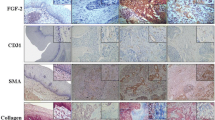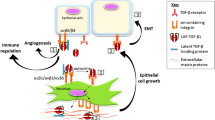The ability of cancer cells to initiate specific fibroblast reactions may subsequently determine tumor evolution. In the present study we examined the coordinated expression of transforming growth factor-beta-1 (TGF-b1), its signaling receptors, and its downstream mediator—connective tissue growth factor (CTGF)—and their impact on tumor progression and fibrogenesis in esophageal carcinomas. Messenger ribonucleic acid (mRNA) expression of TGF-b1, CTGF, TGF-b receptor subtype I ALK5 (TbR-IALK5), and TGF-b receptor type II (TbR-II) was studied by Northern blot analysis in esophageal cancer and the normal esophagus. By means of immunohistochemistry and Western blot analysis, the respective proteins were localized in the tissue samples and the protein content was quantitated. Northern blot analysis revealed 3-fold and 4-fold increases (p <0.05) in TGF-b1 and CTGF mRNA levels, respectively, in esophageal cancer in comparison with normal controls, whereas TbR-I mRNA levels were significantly decreased and TbR-II mRNA levels were unchanged in the cancer samples. Immunostaining revealed results similar to those seen on the RNA level. TGF-b1 and CTGF immunoreactivity were increased, TbR-II was unchanged, and TbR-IALK5 immunoreactivity was decreased. CTGF immunoreactivity was mainly present in the stroma surrounding the cancer cells but was also present in the cancer cells. The degree of fibrosis was different in squamous and adenocarcinomas and was significantly related to CTGF mRNA expression levels. The presence of CTGF in squamous cell carcinomas was associated with longer survival, whereas in adenocarcinomas it influenced survival negatively. The findings indicate that TGF-b signaling is disturbed in esophageal cancer. CTGF, a downstream effector of TGF-b action, differentially influences the composition of tumor microenvironment and distinct cell-matrix interactions in the two histological types of esophageal carcinoma, resulting in differences in tumor progression and patient survival.
Similar content being viewed by others
Author information
Authors and Affiliations
Rights and permissions
About this article
Cite this article
Koliopanos, A., Friess, H., di Mola, F. et al. Connective Tissue Growth Factor Gene Expression Alters Tumor Progression in Esophageal Cancer. World J Surg 26, 420–427 (2002). https://doi.org/10.1007/s00268-001-0242-x
Issue Date:
DOI: https://doi.org/10.1007/s00268-001-0242-x




